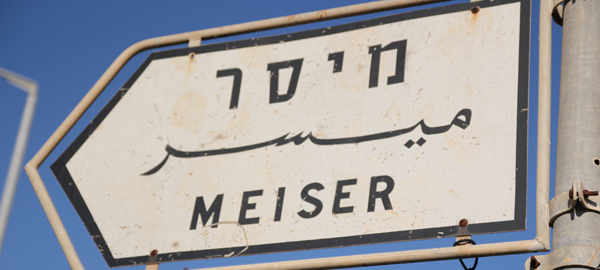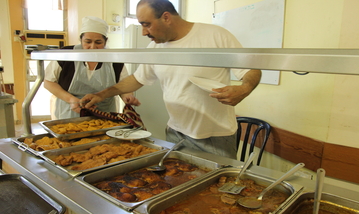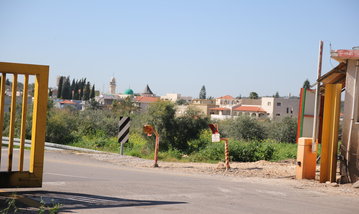About Meiser:

An Arab Perspective
By Bethany Firnhaber
Said Arda is a liberal guy. He thinks there is enough land in the world for everyone - Arabs and Jews alike - to live in peace. And while he is not the only Arab in his village who believes that, his views are not necessarily those of the majority.
"What I say is for myself, for Said Arda," he said of his left-leaning opinions, "and I don't represent my family and my community."
Arda, 50, was born in Meiser to parents who lived in Palestine before the state of Israel was established in 1948.
"We are a traditional Arabic village," said Arda of Meiser. "It's not modern here. You can't find things here like in Nazareth, for example, where girls are free to walk and travel alone. It's a traditional place, so the family and the men, they are who decide how the family will arrange its life."
Arda does social work in Meiser, especially for young children in the two communities. He organizes activities such as summer camps for Arab and Jewish children to play and interact socially. In the past, he helped form a neighbors forum between Meiser and Mezer, in order to strengthen and maintain the mutually respectful relationship the two communities share.
But despite all that, the coexistence Arda describes between Mezer and Meiser is not a whole lot more than the word implies - that the two communities live side by side, and that they exist in unison. They live and let live. And while yes, there are liberal Arab folks like Arda who invite Jewish folks to their weddings and funerals, the interaction between the two groups is still very limited. Real personal interaction is something Arda is still working hard to achieve. Because like anywhere else, Arda said, "you can find people here [in Meiser] and also in Mezer who think...that there is no place for the other side here, and that it's only for the Arabs or only for the Jewish people, this land.
But while Arda is more accepting of his Jewish neighbors than some in his community, he is still an Arab citizen living in Israel, and that comes with certain restrictions. Arda has a very big family – most of whom now live in the Occupied Territories. Because of laws put in place by the Israeli government to ward off possible terrorist attacks, none of them can cross into Israel to visit Said and his family at home.
“All of my family – the big family – live in the West Bank,” said Arda. “Since maybe nearly 20 years they can't come here. But I travel there sometimes. Once every two or three months.”
To Arda, though, the question of visiting with his extended family isn't hugely important. He's more concerned that his own children grow up well-rounded and with a sense of their own heritage. That's why, before his first of four children was born, he asked his German Christian wife to convert to Islam, at least on paper.
“I am a social worker and the identity of my children was very important to me,” said Arda. “I can't imagine small children that can't define themselves. So for me it was very important to define for them who they are and what they are.
“When people ask me if I am Muslim or Jewish or something, I say that by accident I became a Muslim, because I was born to Muslim people. But because of the children and their future, and because we live in a small place like this, I asked my wife to be Muslim just for the papers.”
Community Profile
35 degrees 2'31.54'' E
Meiser Chef Awni Abu Arkih Serves Lunch at Mezer

A View of Meiser
